THE Daily Egyptian



College seniors start to prepare for their next steps. Whether they decide to join the workforce or continue their education, graduates have to get ready mentally for life after college.
“Looking upon graduation, I’m feeling positive about it,” SIU senior Brady Clark said. “The only negative thing I feel bad about is definitely the experiences that I’ve had here
and the friendships that I’ve made and that’s what I’m going to miss the most and I wish I could carry them forever. But, you know, all good things have to come to an end at some point.”
Adjusting to the big change after college can be difficult for graduates.
Leaving behind their friends and school can be challenging.
“To be honest, I wasn’t really ready to graduate. I’m definitely am going to miss the people more than
anything. I will miss my friends that I’ve made here but friends are always there no matter what, wherever you go,” Clark said.
Walking across the stage and receiving a college diploma is a huge accomplishment. Some students, however, can be self-conscious about receiving honors awards and being top of their class.
SIU Senior Kaylie Vallette said, “I do have some anxious feelings
cArly Gist | cGist@dAilyeGyptiAn com
In a time where mental health occupations are expected to grow, Southern Illinois University is offering several related majors to inquiring students. Among those majors are sociology, social work and psychology.
“Most importantly, students
should pick a major that is of interest to them,” said Reza Habib, the director and an associate professor of the School of Psychological and Behavioral Sciences at SIU.
“In addition to offering a wide variety of classes, the psychology program at SIU offers students many opportunities to get involved
with what mental-health researchers and professionals do on a day-to-day basis,” he wrote in an email.
Those opportunities include research in laboratories and participation at external centers, such as Project 12 Ways, the Center for Autism Spectrum Disorders and
“Discriminatory” and “unfair:” International students react to change in health insurance policyciAn lehtonen clehtonen@dAilyeGyptiAn com
Set to take effect in the 2024 Fall semester, all international students, particularly those students who are also TA’s and GA’s, will no longer have the right to choose a private health insurance company and to opt-out of the school health insurance. Up until now, the international student population(s) has retained the same right as all other SIU students where you can choose to opt-out of the school insurance if you can prove that you will still be insured just by another company or agency.
“As an international person, this decision makes me feel discriminated against, it makes me feel that our needs and concerns are not important and are not listened to at SIU,” said an international graduate assistant who asked to remain anonymous.
The Daily Egyptian reached out to the administration for comment and did not receive a response by the time
of publication.
According to the school health insurance plan information packet, the cost to be insured through SIU would be $1,139.00 per person per semester as an added fee to the school tuition bill if the student should choose to be insured.
“Being forced to enroll in the school’s health insurance would significantly impact my financial stability,” said another international student, a teaching assistant who asked to remain anonymous. “I would have to depend on community pantries to have some food, since the remaining funds after paying for insurance and general student fees, would barely cover rent, leaving me with less than $50 monthly.”
The optional fee is already a substantial amount of money for many younger university students that are from the United States, however the benefit of
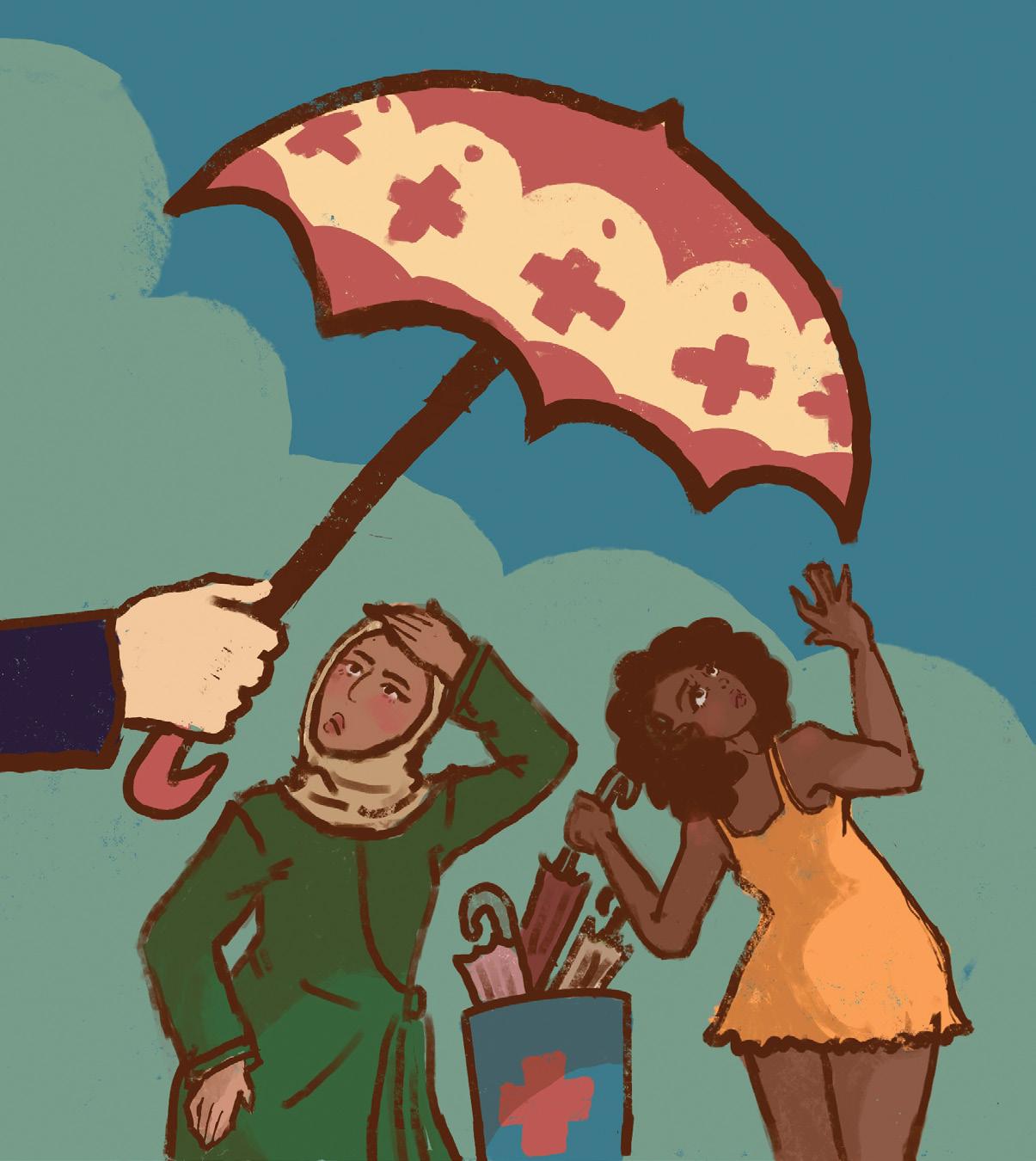

being an American citizen and resident is that people from the United States have the ability to get loans, whether from a bank, a private company or even from federal student aid loans.
However, internationally born individuals, especially those who are younger and may come from a less developed country, don’t have the option to independently receive or even the privilege to ask for a loan, due to the facts that they most likely don’t have a credit score, as in less developed countries lines of credit are either not common or just don’t exist. Finally, international students are often seen as high risk by banks or government lenders because they lack credit scores and may not be staying in the country.
Most of the international students who are going to be affected by this policy change from the school will predominantly be international graduate students who are TAs along with GAs, as international students who rely on their teaching positions for their scholarship, have a visa that’s known as an F1 visa. These international students cannot legally be employed anywhere else, even at the school they attend. Therefore the students are limited to a rigidly tight budget of whatever they make each month.
The average TA monthly salary at SIU is between $1,000 and $2,000 before taxes. For example, a TA in the linguistics department who spoke anonymously makes $1,389.47 each month after taxes. However that
amount is before paying the schools fees, which can range a bit over $100 per month, leaving little to pay for housing rents which can vary between as little as $200 a month to as high as $1,000 a month depending on if they live with roommates, location, along with if the place rented is a house or an apartment.
“I still have to pay rent and utilities, and also save to pay student fees during the summer, since my program requires me to enroll in credits during the summer, even though they do not pay me. [I]t is no secret to anyone that the salary that SIU pays us as TA’s is low. When I was paying SIU insurance, I had a hard time financially, I had to pay the university almost $240 a month for the insurance alone, that plus student fees, equivalent to approximately $400, almost 30 percent of my salary, each month.”
rely on local food pantries that are not associated through the school or the government. The three people consulted and interviewed for this story noted the same common complaint, that the school food pantry is not largely accessible due to its hours of operation overlapping with either their associated class or teaching schedules.
It is worth noting that in most food pantries, you can only attend one time per month and there is a quota
of less financial means have to go to a different pantry each week or so in order to have enough food to survive and be healthy, as their salaries do not meet the cost of living.
“The implementation of this policy only exacerbates the problem, and leaves us in an even more vulnerable position.”
- Anyomous Graduate Assistant
A large struggle outside of paying for rent and associated utilities for international students, which is similar to the arduous financial endeavors that domestic students struggle with, such as rent and food. Many internationals rely heavily on the local food pantries to have enough food to eat. It is worth noting that international students
on how much each person is allowed to take. For a group of people who might live alone and for the most part don’t have a car or enough money to pay for a ride through Uber or Lyft, even accessing these pantries can be a task that can take all day, with walking to each pantry, waiting their turn at each pantry in the number que, which can take several hours, and finally walking back to their homes carrying bags and/or boxes of food, depending on what’s available. Regardless, it’s not an easy task that can be done on a school or work day. Many of these students or people
The teaching assistant said, “I truly feel that this is going to affect my academic process considering that I would now have to find out ways to get food, leaving me with less time to focus on my studies (take into consideration that going to a pantry can take an entire day). And, given the high stakes that we, internationals have in maintaining our academic standing, there is no opening to failing or getting a low grade. If that were to happen, the school would take away our assistantships and we would have to go back to our countries.”
The policy would greatly impact the lives of countless international students, and thus as a result would have substantial long lasting effects in the quality of education being given to students by financially and academically stressed student workers.
“Many of us constantly deal with our mental health. The implementation of this policy only exacerbates the problem, and leaves us in an even more vulnerable position, without options,” the
graduate assistant said.
Another result that would impact SIU as a whole would be the decrease in equity of opportunities for individuals from all of the globe to have the option or ability to come to SIU and the States to receive their higher masters or doctorate education. The ability to come to SIU would be limited to those individuals who predominantly come from financially more secure family situations and from more first or second world countries, which would be denying the realistic chance of education to those from a lesser financial background; like individuals who come from third world nations or with no family to help give financial assistance.
“We deal with many processes related to our immigration grief. On top of all that, we add all the economic worries we have due to not being able to comfortably cover all our needs,” the graduate assistant said.
The student workers who spoke with the Daily Egyptian agreed the new insurance policy is misguided.
“I do feel I am being extorted because of my international status, I do not know the reasons why this policy only applies for international students but not domestic students. Without clear reasons, I will continue to consider this policy as unfair and discriminatory against the international community.”
Staff reporter Cian Lehtonen can be reached at clehtonen@dailyegyptian.com
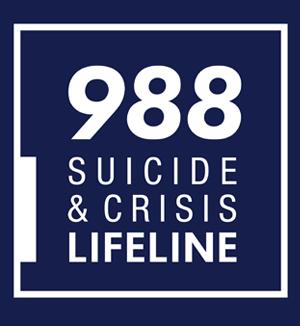
Student Health Services seeks to support student mental health by raising awareness of mental health symptoms and increasing access to support services on campus and in the community. Our hope is to improve the emotional wellbeing of the student population by encouraging support-seeking skills. Call 618/453-3311 or visit shc.siu.edu to learn more about mental health and basic needs resources on campus. CAMPUS SUPPORT AND RESOURCES:
• Counseling and Psychological Services
• Connect@SIU after-hours support and risk assessment (833) 434-1217
• Psychiatry
• The Peers Heroes Program
• Confidential Advising, Survivor Support
• Saluki Cares
• The HEROES Headquarters Resource Center
• Wellness and Health Promotion Services
• The Dawg Lounge
• The HEROES Hideaway
Scan the QR Code for more information on mental health resources and basic needs at SIU.

SIU’s Counseling and Psychological Services (CAPS) training program is commemorating half a century of providing top-tier training in the field of psychology. Staff members there say CAPS remains steadfast in its commitment to providing support and mentorship to aspiring psychologists, with a legacy built on excellence and innovation.
Marquitta Bowman, assistant director of CAPS and director of training said, “Our training program has been around since 1974 and our internship program was the sixth accredited program under the American Psychological Association…so we’ve been around for a very long time.”
The CAPS training opportunities include both its internship and practicum programs, catering to the diverse needs of graduate students pursuing careers in psychology.
The doctoral internship is primarily focused on providing interns with generalist training to prepare them for practice in diverse applied settings. As part of this comprehensive training, interns can expect to dedicate a portion of their time at CAPS to engaging in training activities aimed at enhancing their professional development.
Bowman said, “As for internships, we basically interview doctoral students all over the US, Canada and Puerto Rico, and we only get six students for those positions. Students from any accredited college can apply for an internship, so they don’t have to be from SIU.”
Following the application process, interns participate in what they refer to as the “match.”
“It’s almost like what the medical students go through as well. We see who matches with us based on their credentials, interviews, and scores, and that’s who we get,” Bowman said.
The doctoral internship spans a duration of one year, starting on Aug. 1 and concluding on July 31 of the following year.
Bowman said, “The program includes getting references from their previous practicum supervisors. They have to be able to obtain a certain amount of clinical hours, usually, about 400 to 500 is best. They have to do their proposal defense which is the prerequisite to their dissertation and have to be in with that to be within good standing with the APA and their institution.”
Similarly, the practicum training program provides experience specifically for SIU graduate students. The program aims to equip students with the practical skills and knowledge necessary for effective practice in the field of psychology. MaryKate Freeman, who is the practicum
training coordinator, said, “It’s a little different because we only take graduates that are enrolled in graduate programs, so they have to be current students. The application for practicum programs is actually happening right now.”
Applications are accepted through July, and prospective students must undergo an interview process as well. While the number of students able to participate in the internship program is limited, the practicum program accommodates a
who want to focus more on children and they’ll actually go out to different schools and work with school social workers or school psychologists.”
The clients assigned to students depend on their individual areas of specialization or the availability of cases at the given time.
Freeman said, “When they come to our site, they see students that come to our counseling center.”
Since interns from both programs work on
“We have seen well over 10,000 clients this year so far. And we suspect that before school is out, we’ll probably be around 12,000 plus.”
- Marquitta Bowman Assisstant Diretor of CAPS and Director of Training
broader pool of applicants.
“We don’t have a set number, but it’s interesting, because there used to be a counseling psychology program here at SIU, and there were about 22 practicum students, but this year we had six. So it’s drastically different from year to year,” Freeman said.
The program aims to take as many individuals as possible, striving to assign each therapist, including interns, an average of 18 to 20 clients.
Bowman said, “We have seen well over 10,000 clients this year so far. And we suspect that before school is out, we’ll probably be around 12,000 plus.
Increasing the availability of resources and personnel is essential for effectively meeting the diverse needs of clients and ensuring timely access to support and services.
“It gets everyone involved and more people get the help they need, because main CAPS isn’t our only area. We have CAPS at the Multicultural Resource Center, the Law School, Aviation, and University Housing. So we’re everywhere,”
Bowman said.
When students complete their clinical hours, they get placed with their own clients. Most universities have a University Counseling Center, but if not, they typically go to other agencies that are looking for students to help assist in seeing clients.
Bowman said, “So you have some students who go and work with people that are doing community mental health, focusing on alcohol and other drugs. Some people go to hospitals because they want to work with severe clinical presentation, and then you have certain students

campus with other students, it’s essential to maintain professional boundaries and prevent any potential conflicts of interest. This includes ensuring that practicum students do not treat clients they may have prior relationships with, such as classmates or acquaintances.
“The interns that we get are not students from SIU. So they don’t have clientele they know. But for practicum students, that is the case. They are students here, so we take extra care to make sure that they’re not assigned somebody that they know,” Freeman said.
In instances where there is a conflict of interest, such as when a student is assigned to a client they have a pre-existing relationship with, immediate action is taken to reassign the client. This is done to ensure the comfort and well-being of both the client and the student.
Bowman said, “This applies to individuals in various roles, including resident, graduate, or teaching assistants, as well as members of fraternities or sororities. If they have affiliations with clients, they are encouraged to inform us to prevent any potential conflicts of interest.”
By upholding these standards, CAPS aims to foster a safe and ethical environment for all clients, regardless of their connection to the university community. By navigating these situations, participants develop valuable skills in client confidentiality, trust-building and decisionmaking. This hands-on experience reinforces their understanding of ethical guidelines and prepares them to navigate similar challenges in their future careers as mental health professionals.
The program continues to redefine the standard of psychological education, Freeman said.
“I think the biggest asset that we can offer is just the emphasis on training,” she said. “A lot of other sites that students can get their hours and they may offer only one hour of supervision. We offer one hour of supervision a week, but we also have group supervision, as well as an hour and a half training seminar that they take part in. So we have different levels of supervision support that we offer them so that they can get experience

learning and applying the skills.”
She said the program offers more supervision time because organizers want to make sure it maintains a collaborative approach.
Bowman said, “We really do invest in people’s training and we invest in them. We invest in them in regard to what type of therapists they want to be, whereas in most others some of the supervisors want you to do things their way.”
For doctoral interns, the goal is to receive 500 direct service hours in order for them to be eligible in all 50 states for licensure, and then they have to receive 2000 hours total in order to complete the internship training.
The doctoral interns are also expected to fulfill a minimum of 50 hours dedicated to community intervention or outreach.
Freeman said, “There’s so many opportunities for that here at SIU because of how involved people are in the community.”
Given the multitude of requirements to fulfill, it’s crucial that interns receive support from staff members. The program operates under an open-door policy beyond scheduled supervision sessions. If participants have a question or concern, they can find any senior staff in turn that has their door open, and they can talk with them.
“As the training director, my goal is to make sure that I am watching their hours very closely. I’m always letting them know every other week or bi-monthly where they are. And if they’re not where they need to be by a certain point, we have a support plan that helps them get to where they need to be so that they can effectively complete their internship,” Bowman said.
If an intern falls behind in their direct service hours, CAPS will reassign their responsibilities to focus on accumulating the necessary hours.
Bowman said, “One of the things that I think that I liked about SIU is that we [she and Freeman] both worked as doctoral interns here, and we stay here because the training is that good and we have a high retention rate of keeping our interns to come on board and do their postdoc hours and then become senior staff.”
Approximately 95 percent of the staff were former interns in a CAPS training program.
“It goes to show you that the training is rich, it’s productive. It’s been effective. It’s been around for 50 years. It shows how rich we are in terms of the services that we provide, I mean, I even tell our clients that if you look around, we want you to know that we are family here,” Bowman said.
She emphasized that all participants receive thorough training within a campus environment, which she believes contributes to their sense of reassurance. She too has been able to find comfort in the comprehensive training provided within this familiar setting.
“When we are interviewing doctoral intern candidates, we let them know we wouldn’t tell you anything that we didn’t go through ourselves…we all did this internship too and we want to invite you to join in on the richness here,” Bowman said.
The training program is committed to fostering a supportive and inclusive environment for all participants.
“Ultimately, we want everyone to understand that how they see themselves as a therapist really matters,” Bowman said.
Visit the Student Health Services website to learn more about the Internship and Practicum Training Programs.
Staff reporter Annalise Schmidt can be reached at aschmidt@dailyegyptian.com
the Evaluation and Developmental Center.
“Students can gain hands-on experience working at one of these centers as part of the preprofessional practicum class,” he said.
Many degree programs are offered for psychology majors.
“At the undergraduate level, the school…offers a BA [Bachelor of Arts] in psychology, a minor in psychology, a minor in neuroscience, a minor in behavior analysis and therapy and a specialization in parent training,” Habib said.
A master of science degree is also offered in behavior analysis and therapy. For those with a master’s degree in a separate discipline, an online certificate in Behavior Analysis and Therapy is available as well.
“At the Doctorate level, we offer a PhD in Psychology with concentrations in Applied Psychology, Behavior Analysis and Therapy, Brain and Cognitive Sciences and Clinical Psychology,” he said.
Additionally, mental health-related courses are available at the undergraduate level. Teaching Assistant Riley Marshall said a class titled “Psychopathology” is offered, where “you learn about every disorder in the DSM [Diagnostic and Statistical Manual of Mental Disorders].”
Assistant Professor of Psychology Youjung Choi described the field as a type of science that is “more interested in the human nature.”
“We use a scientific method to learn more about humans,” she said. “So in terms of materials or topics, we are more close to…liberal arts and those types of areas but…how we are going to explore it is in a scientific way, so we kind of combine those two.”
Choi is a developmental psychologist. She said she focuses on what humans are born with and how that changes over time.
“I’m trying to provide some basic knowledge about human nature and then apply psychology…or other [fields], and try to, based upon those results, then create any policy or intervention ideas and things like that,” she said.
Habib said that the major can open up “many different career paths.”
“[Students] can become mentalhealth professionals, they can work in industry…they can become scientists and researchers,” he said.
Choi said that the field used to focus mostly on environmental factors, but that has changed over time.
“With the development of technology, we are more focused on individual differences not only solely based on environment affectors but based on other things, which is the genes or a [neural-related] differences in their brain and things like that,” she said. “So it’s kind of like a trend, but we never ignored environmental influences.”
She said the most beneficial thing
about studying psychology to her was knowing the field “[helps] you to know who you are.”
While psychology focuses on many different factors, the field of sociology places an emphasis on external ones.
Associate Professor of Sociology
Christopher Wienke said, “A psychologist might focus on a mental health problem like depression or suicide and look at what’s going on in the individual’s life that would lead to that, whereas sociologists would kind of consider factors that contribute to depression in general and factors that contribute to suicide in general.”
He said sociologists assess the changes in the field, such as the development of treatments, by “understanding how the mental health field is organized socially and culturally.”
“Sociology, in the simplest terms, is the study of society, which means we study social groups and social patterns, social trends, social institutions, social stability, social change, social interaction,” he said.
Specific areas of sociology include gender/race relations, marriage, family, religion and politics.
“[It’s] just sort of how all those larger phenomena impact our behavior as individuals and groups, in our attitudes and our way we express ourselves–why we do what we do,” he said.
He said sociologists also focus on the social distribution of mental health illnesses, such as “why some groups are more likely to report depressive symptoms than other groups or why some groups have higher rates of suicide than other groups.”
He added that it is important to understand the prevalence of mental health, which the sociology field largely focuses on.
“I think you need to understand whether mental health is tied to access or lack of access to health care, and mental health facilities, [or] whether it’s linked to the functioning of our institutions, like family or religion or education,” he said. “Also, sociologists study what might be called the social construction of mental health. What is considered healthy or unhealthy? How have those ideas changed over time? Do they vary from group to group or from culture to culture?”
Wienke recognized that the field of sociology is not “tailored” for mental health occupations, but noted that there are many related paths students can go into with the degree.
“People in sociology degrees can go into areas such as substance abuse, rehab, counseling, family planning, health care management, working with at-risk youth…working with elderly and working in various local state federal agencies, [such as] child services,” he said.
He said sociology courses can also prepare students for future work in mental health by teaching them applicable methods.
“Students learn skills that can be
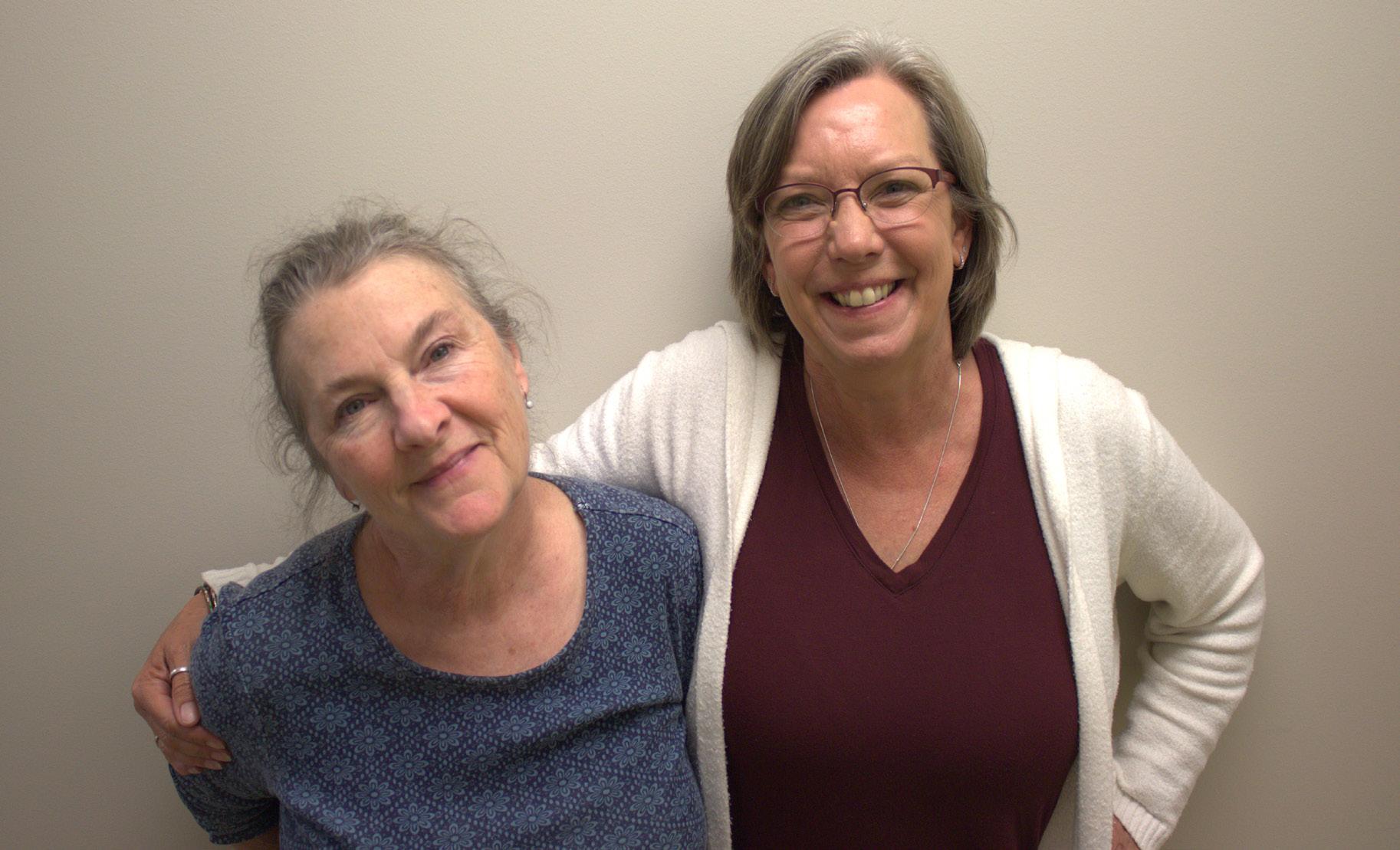 Photo by Daylin Williams | dwilliams@dailyegyptian.com
Photo by Daylin Williams | dwilliams@dailyegyptian.com
applied to mental health professions, including critical thinking skills, analytical skills, oral communication skills, social skills–you know the ability to interact with people from different social backgrounds–showing empathy [and] cultural competence,” he said.
Prior to his current position, Wienke was the undergraduate director of sociology. During his time in the position, he saw students take their degrees in many different directions. While looking at a list of where his former students are today, he sees some are counselors and therapists, some work as family reunification specialists and juvenile justice specialists and others work in youth services.
While Wienke holds a Ph.D. in sociology, the level of degree necessary varies from occupation to occupation.
“Some [students] go directly [into the workforce] and others will go to grad school and get at least a master’s,” he said.
SIU offers bachelor’s, master’s and doctoral programs. Prospective students can expect to find themselves in a broad field with a variety of career options.
“Sociology allows you to better understand the social world as well as your own life,” Wienke said.
Similarly, the field of social work focuses on an individual’s surroundings.
“One of the things that I think really sets social work apart is we have a theory called person-in-environment,” Sarah Dobie, Graduate Program Director and Associate Professor of Social Work, said.
She said that related fields may follow a “medical model” instead, which focuses on an individual’s symptoms and behavioral issues, and works to give them a diagnosis.
“What social work does is we might do that part, but then we start looking in their environment, and start to see, well, maybe this child’s acting out because he’s watching dad beat up mom at home,” she said. “It has nothing to do with him. He doesn’t have a problem, he’s having
a natural reaction to his situation and environment.”
Sarah Basler, the undergraduate program director/field coordinator and assistant lecturer of social work, said advocacy is also a huge aspect of social work that sets it apart from other fields.
“When you go from that person and environment model, then you’re also looking at ‘how do we change this?’” she said. “Like I always tell my students, my whole job since I started is to work myself out of a job. How do I keep advocating to see what needs to be done, to see what needs to be changed in the community and the environment, in the school systems, whatever it is and however it is.”
Basler said advocacy is “one of the most important things” to her.
“That is how we change systems, and we are change agents,” she said. “That’s what social work is.”
According to Pacific Oaks College, many career options are available for students studying social work, including clinical therapy, community outreach, counseling and human services.
Dobie said the field offers “a lot of flexibility.”
“Say you start young [as] a school social worker and you get out there in the schools and you [don’t like it]. If you want to switch and go work with hospice, for example, there’s no reason you can’t,” she said. “You can definitely switch and change disciplines in where you work and I’ve seen lots of people who did that exact same thing.”
Basler said that the profession is “everchanging.”
“I worked in substance use for many, many years, and then I was like ‘Ooh, crisis work in the hospitals, that sounds like a cool thing,’” she said. “So then I’m like ‘Ooh, I’ll try that.’ So every job that you work in, you gain that network and you gain that experience and you just keep building on it. So then [if] you do decide [you’re] ready…to be a therapist,
private practice, you have all these skills that go right back to that–how do you help that person in the environment?”
SIU offers both a bachelor’s degree in social work and a master’s degree. The school is currently in the process of adding a doctoral program. For students with a bachelor’s in social work, the master’s degree can be completed in one year rather than the typical two years for people with other majors.
Illinois also offers two types of social work licenses: Licensed Social Worker and Licensed Clinical Social Worker. An LSW can be obtained by completing a master’s degree or by completing a bachelor’s degree and three years of supervision under an LCSW. To earn the LCSW, however, a master’s or doctoral degree is required, as well as 3,000 or 2,000 hours of supervised clinical professional experience, depending on the major, respectively.
Additional certifications can be obtained as well.
“A lot of things with social work are just in-the-field, on-the-job training,” Basler said. “And usually the organization that you choose specializes in something, and then they guide you on the trainings and the supervisions… for those certificates that you need.” Alongside sociology and psychology, social work is a versatile field.
“There’s so many different things to do, but mental health is definitely up there,” Basler said. “We have worked very hard–the NASW [National Association of Social Workers] nationally and internationally has worked very hard to break down the stigma of what mental health is…Everywhere you go that you’re working in social work, you’re going to deal with the other area. So even if you’re not in mental health…you’re going to find somebody that has mental health and you need to know how to help that.”
Staff reporter Carly Gist can be reached at cgist@dailyegyptian.com

Burnt out. Tired. Bags under your eyes. Low energy. Waking up feeling like you didn’t get enough rest. Not enough time for you to relax. Headaches, anxious and unmotivated. Yup, these are all symptoms of mental and physical stress.
Feelings of depression and stress can also have physical symptoms that warn your body.
According to mentalhealth.org, “Depression can come with headaches,fatigue and digestive problems, and anxiety can create an upset stomach, for example.”
For example, if you are a college senior you might tend to be more tired than usual, have less energy to do things or recurring headaches.
“The school work is getting harder and feeling like a lot. I’m drained” said Deja Norris, a senior nursing student.
According to the mentalhealth.org website, “Our bodies and minds are not separate, so it is not surprising that mental ill health can affect your body.” Nearly one in three people with long-term physical issues also has a mental health condition.
“People find maladaptive ways of dealing with stress, either with bad habits, or they self medicate with doing drugs or drinking,” said community counselor Torono Moore, who works for a non-profit.
Both male and female undergrad and graduate students deal with stress..
A Gallup poll taken during 2023 sampled 2,430 students who are pursuing their bachelors degrees at a four year U.S. institution.
It found female undergraduate students are more likely to experience negative emotions daily more than their male peers. Approximately, 72 percent of female students experience stress versus 56 percent of male students. Also, 56 percent of female students experience worry versus 40 percent of males.
“I am currently going through a phase where I am gaining weight and having a hard time focusing,” graduate student Tiffany Moore said.
Not only is college stressful, but the chances of students dropping out can also be very high.
During the postsecondary phase of COVID in 2022, many students decided to “stop out” because of emotional stress. Stopping out means withdrawing from a program for at least one term. In 2022, 55 percent of associates degree students considered stopping
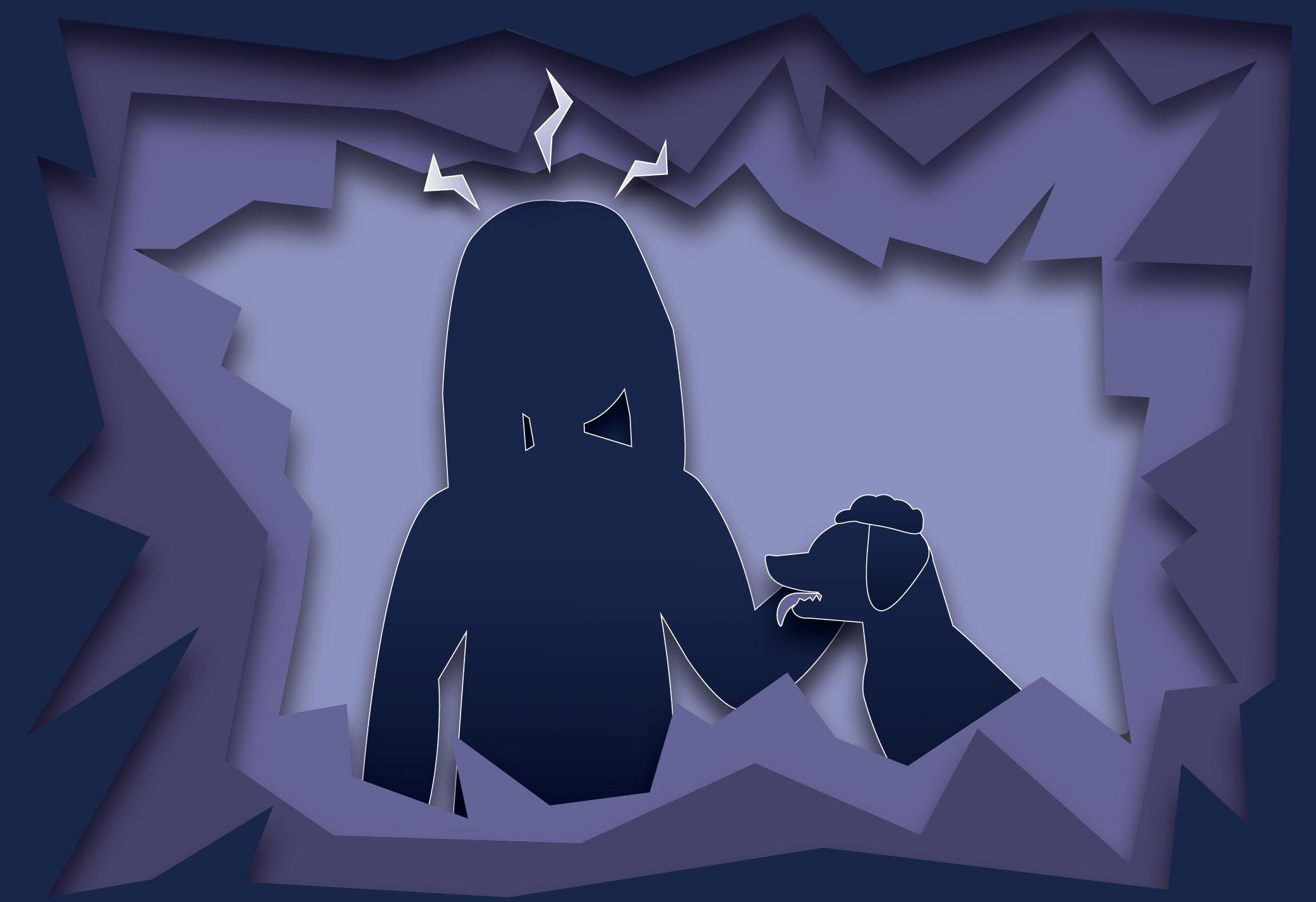
coursework. Also, in 2022, 69 percent of Bachelor’s degree students considered stopping coursework.
There are tons of ways students and professionals are dealing with stress in their lives.
“I breathe in and out to ground myself. In a realistic world, I would go to a therapist and exercise every day,” said occupational therapy assistant Nicole Matthews, who works at Chicago State University..
If you do not take care of your body and mind there can be serious consequences.
“When you have a lot of foods that are high in sugar and iron you have a lots of folks diagnosed with hypertension, diabetes,and high blood pressure,” Torono Moore said.
The Student Center at SIU Provides 24/7 assistance with ConnectedED where students can call and get telehealth support and risk assessments. The counseling office is open until 9 p.m. on the weekends for students who need it.
Matthews creates plans for treatment


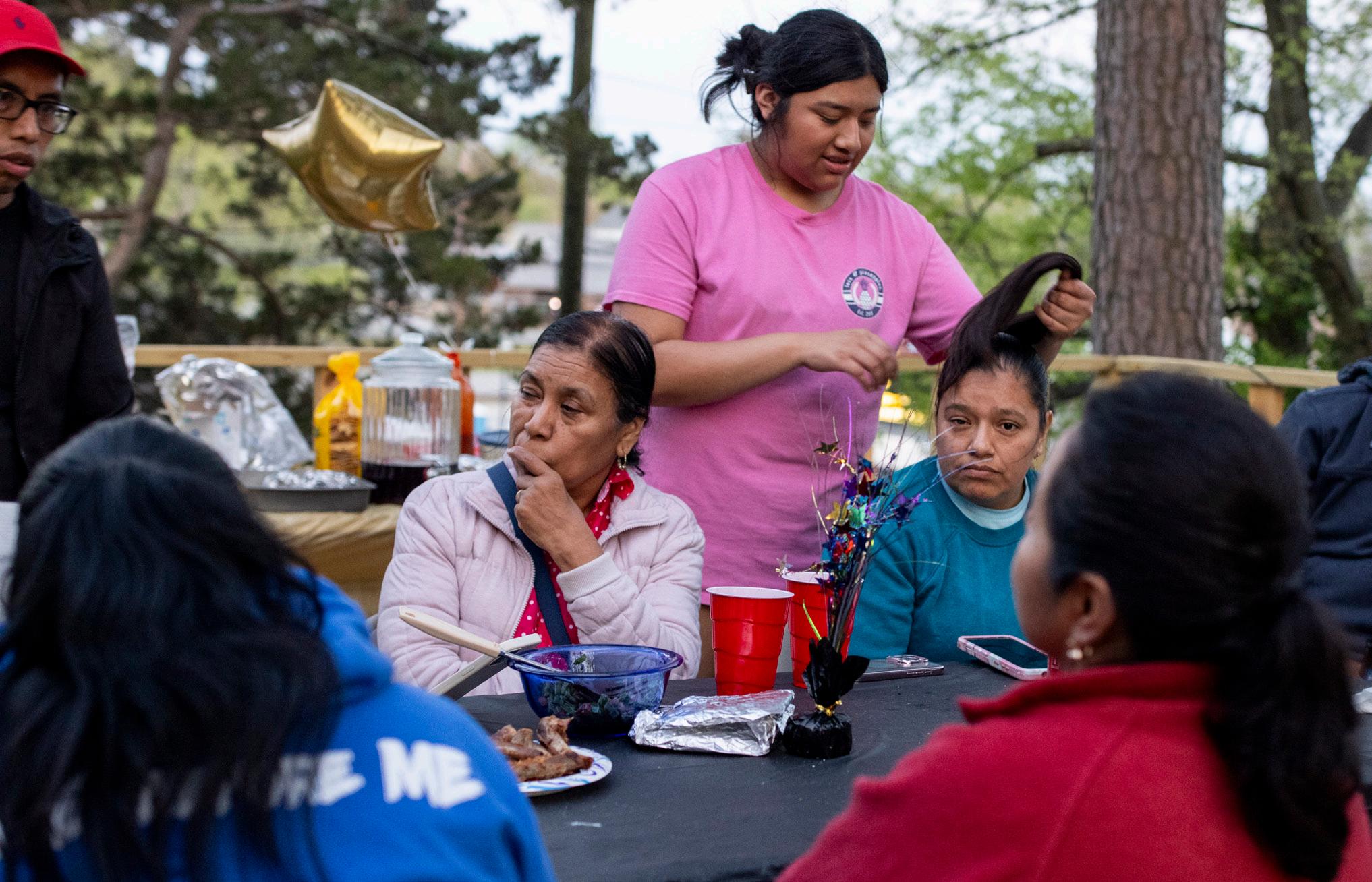
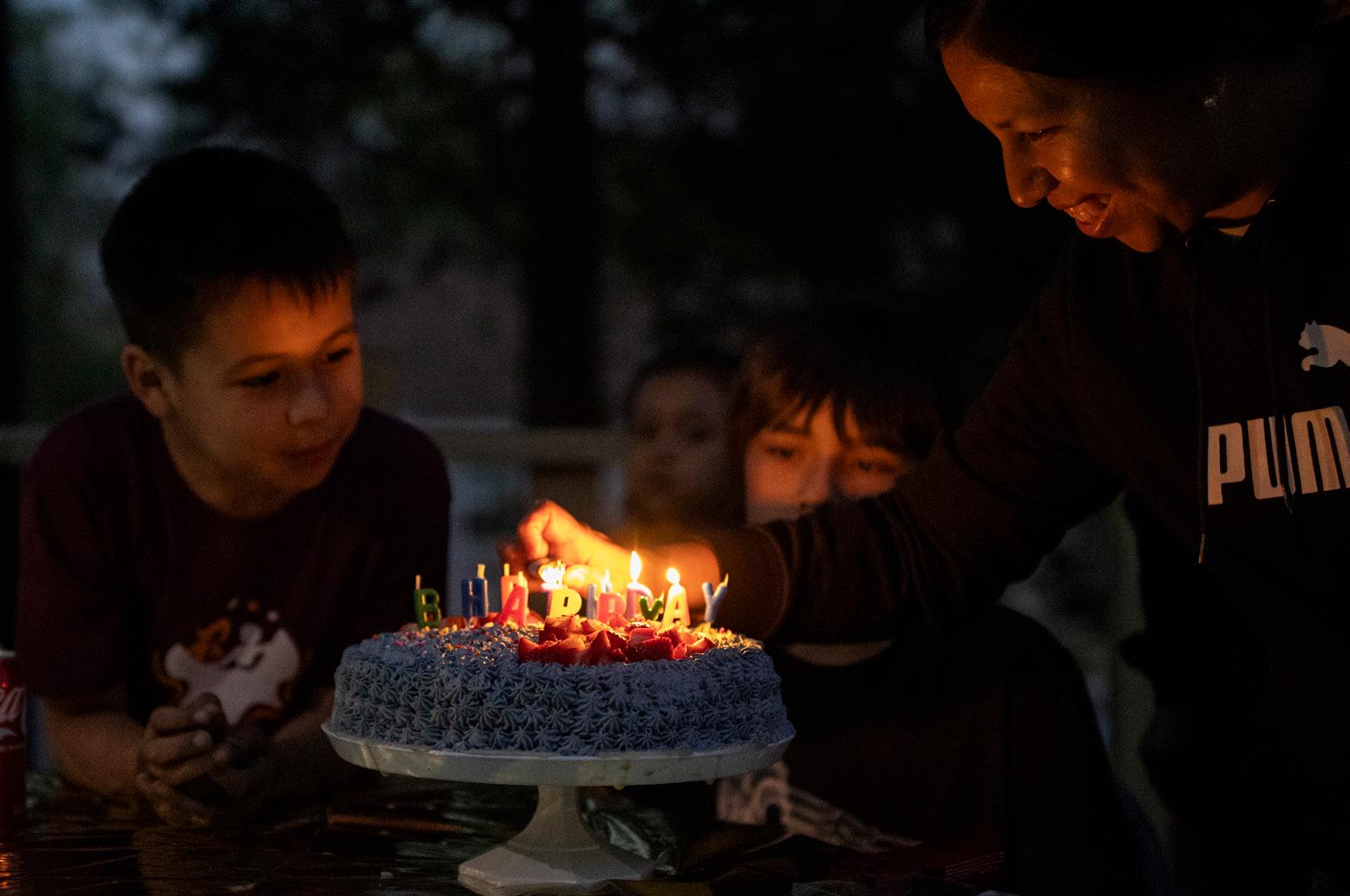
La Mexicana offers a taste of diversity to the small town of Cobden
Enan ChEdiak EnanChEdiakphotography
Cobden is a small town in southern Illinois with a population of just more than 1,000 as of 2022. Despite a population of so few, Cobden boasts quite a bit of diversity, including a large percentage of Hispanic. Serving the Hispanic community in Cobden is Edith Tomas, the owner of La Mexicana, which is a local Mexican grocery store.
Many people in Cobden go to La Mexicana so that they don’t have to travel to Anna, Illinois where the next nearest Mexican grocery store is. In many ways, La Mexicana exhibits the diversity of the city of Cobden.
The Tomas family is among many in this community that immigrated from Mexico.
A close family friend who taught junior high and high school, J. L. Hargis, said, “There was a woman who started a migrant program to work with Spanish-speaking kids because the numbers were starting to really fill up here in Cobden. And it was at a time that would have been close to fruit picking time…Her name was Mary Monavon.” Cobden is especially known for its apples and peaches, and each year the city holds a Peach Festival. One of the
reasons that many of the people in the Hispanic community came to Cobden was to find employment in the fruitpicking industry.
“They followed the crops primarily,” Hargis said. “In fact, on the outskirts of town… there’s a migrant camp, and that’s where they went for just maybe a short, short time.”
But finding employment wasn’t the only reason that many immigrated to Cobden.
La Mexicana’s owner moved from Cherán, Mexico, which is about 200 miles west of Mexico City. She has five children: Santiago, Esmerelda, Noemi, Goreti, and Ricardo. Santiago and Ricardo were born in the United States, while her three daughters were born in Mexico.
One of Edith’s daughters, Noemi Cruz, said, “I came when I was like 7 or 8 years old.”
Hargis, who has known the family since they moved to Cobden, said, “Santiago was probably in 6th grade, but none of them could speak any English. They had to learn that. It took considerable time before you could communicate with the kids.”
Over time, Hargis formed a connection with the family. “I used to come over early on and help them with their classes the first year they were here once
they could understand enough English that I could talk to them…I never did learn to speak Spanish.”
Now, the five children have gone their separate ways, some moving as far away as Mayfield, Kentucky. “Eventually, they all graduated from High School, obviously,” Hargis stated. “And Noemi went to school: she enrolled in [the] Shawnee College program…and she was working with some type of a nursing program. And she has enough education to be easily employed if she wasn’t raising a family, but she’s doing full-time family.”
Family is still very important to them. Edith Tomas said that she first came to the Cobden area because her aunt was here already, and their family has continued to be connected since.
“Basically, all my family is here now,” Edith said. “There are no more relatives in Mexico.”
La Mexicana has been open for more than 20 years.
Edith Thomas said she feels comfortable being part of this society, that she has met a lot of good people, and that she is happy to be here.
Photographer Enan Chediak can be reached at EnadChediakphotography.
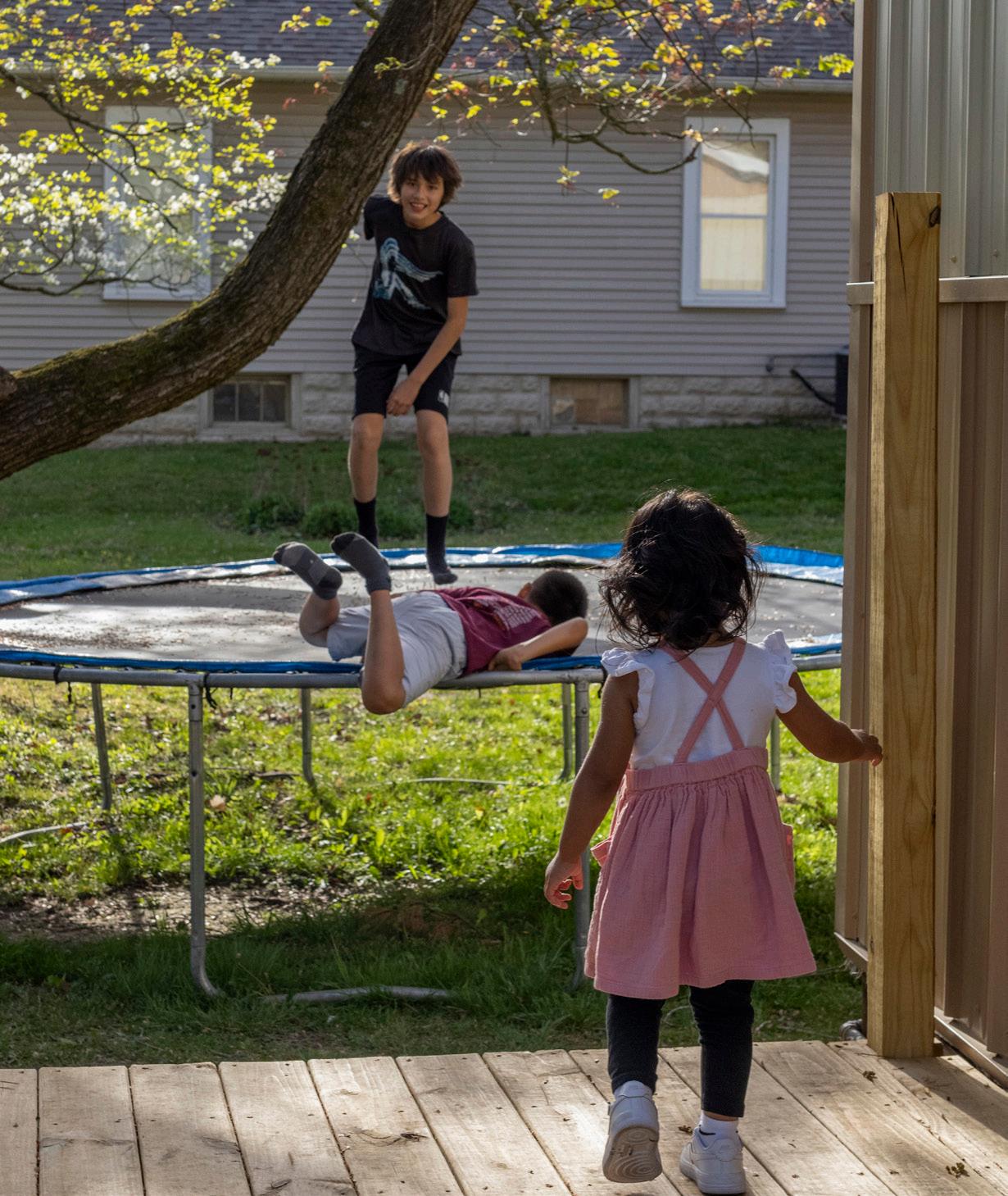
Ana Sanchez trims the
from nopales to be
Nopales are the leaves of prickly pear cactuses and are commonly eaten in Mexican cuisine, but the spines on the cactus have to be trimmed off first before they can be eaten, which can be a treacherous task.

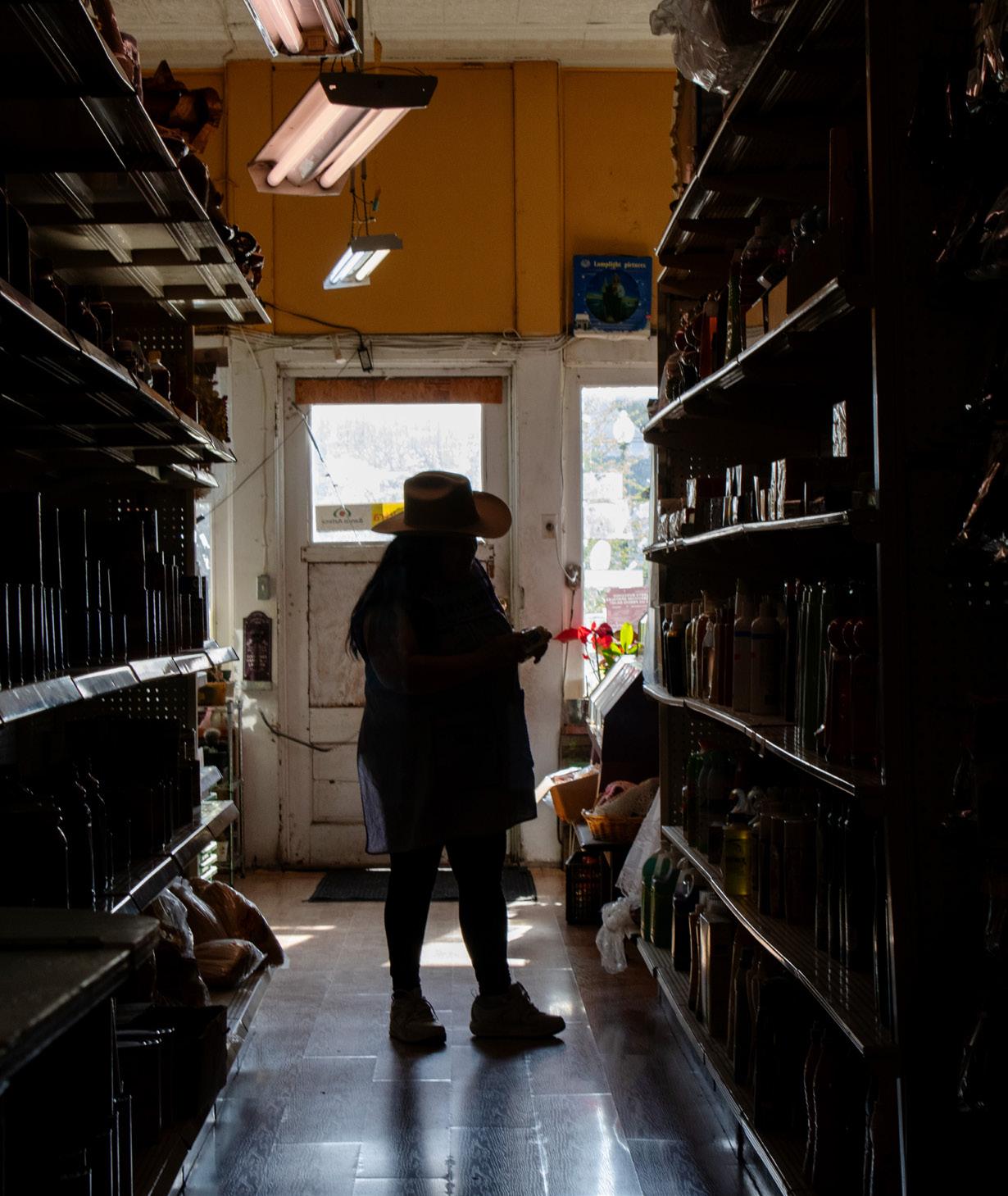

Daniel

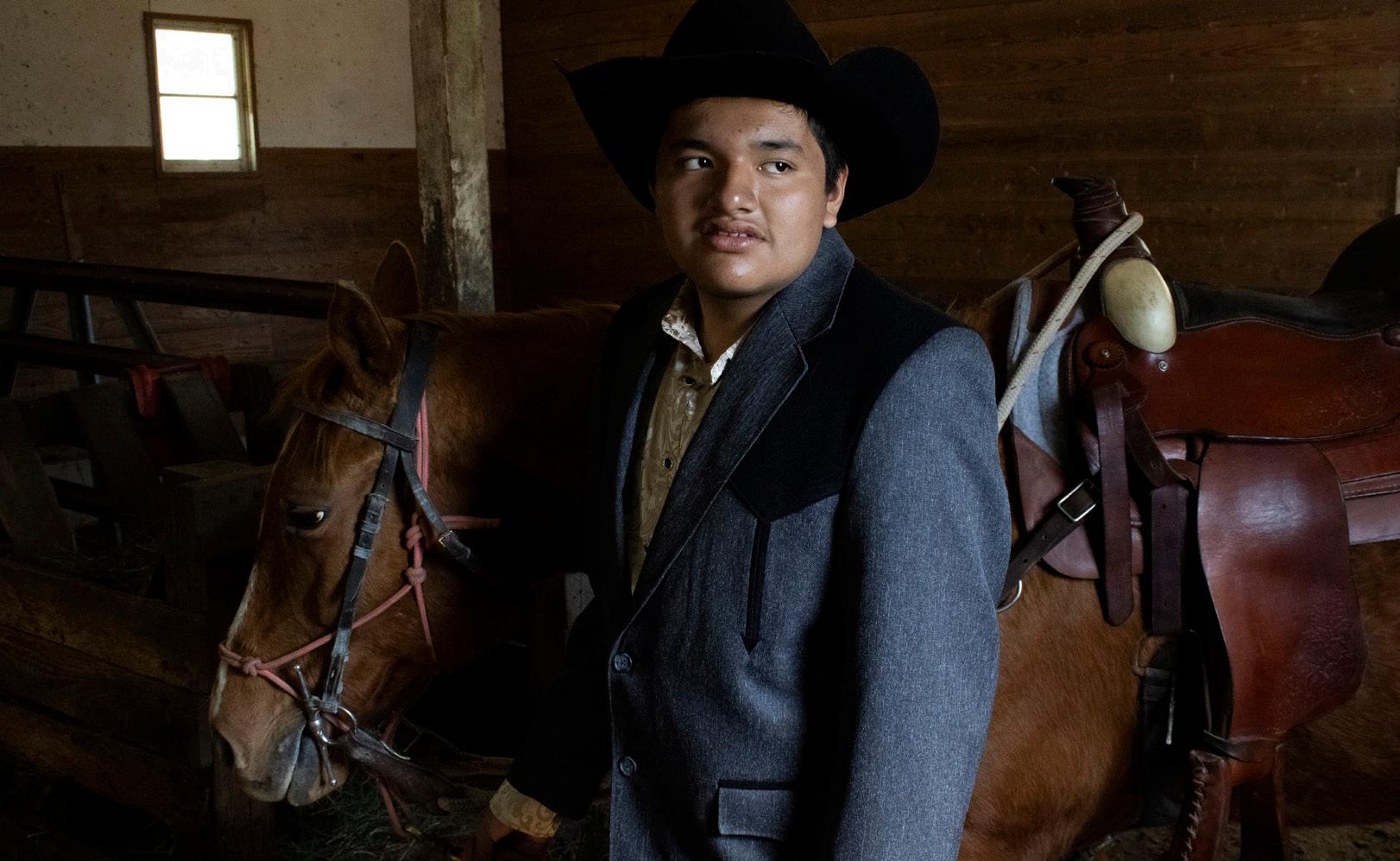 Tomas poses with his family’s horse Mia at their stables.
The Tomas family have three horses, including two quarter horses and a mini horse.
Zitlalli Tomas braids Ana Sanchez’ hair, next to her grandmother Edith Sanchez (left), representing three generations of Cobden residents.
Mark Pitts (middle) waits to blow out the candles on his birthday party April 13, 2024 in Cobden, Illinois.
Haily Cruz and J. L. Hargis (left to right) play with the xylophone. Haily Cruz is the grandchild of Edith Sanchez, the store owner of La Mexicana.
Zitlalli Tomas rides her horse Mia for a photoshoot in her quinceanera dress. She wore her quinceanera dress for the photoshoot, which she kept from her celebration in November of last year.
Asunción Carmona looks at an item on the shelf. Carmona has known Edith Tomas, the store owner, for over 20 years.
Haily Cruz walks out toward Mark Pitt and Fernando Salas on the trampoline during Mark’s birthday party at the Tomas’s house. Haily is one of Edith Tomas’s grandchildren and was among the many of her relatives at the family reunion.
Tomas poses with his family’s horse Mia at their stables.
The Tomas family have three horses, including two quarter horses and a mini horse.
Zitlalli Tomas braids Ana Sanchez’ hair, next to her grandmother Edith Sanchez (left), representing three generations of Cobden residents.
Mark Pitts (middle) waits to blow out the candles on his birthday party April 13, 2024 in Cobden, Illinois.
Haily Cruz and J. L. Hargis (left to right) play with the xylophone. Haily Cruz is the grandchild of Edith Sanchez, the store owner of La Mexicana.
Zitlalli Tomas rides her horse Mia for a photoshoot in her quinceanera dress. She wore her quinceanera dress for the photoshoot, which she kept from her celebration in November of last year.
Asunción Carmona looks at an item on the shelf. Carmona has known Edith Tomas, the store owner, for over 20 years.
Haily Cruz walks out toward Mark Pitt and Fernando Salas on the trampoline during Mark’s birthday party at the Tomas’s house. Haily is one of Edith Tomas’s grandchildren and was among the many of her relatives at the family reunion.


















about graduation because I want to be on the honor roll and have the certain cords and banners on me. I feel like seeing other people having those and I don’t get that it’s kinda upsetting. But, no matter what, I’m still going to have the mentality of, I’m graduating.”
Graduates who choose to continue heir education by going onto vet school, law school, medical school or graduate school can still feel stressed and nervous. To further their education after college, graduates must go through interviews and testing to be accepted.
“My plan after graduation is to continue my education at Illinois, where I will be getting my DVM which is Doctorate of Veterinary Medicine. So, I can become a practitioner to work with animals and I plan on doing a mixed animal practice of livestock, cats and dogs,” Clark said.
Choosing to further your education after college can be a difficult decision. Some graduates are burnt out after completing four years of schooling. Factors such as price, location and the application process can deter students from choosing to continue their education.
“My process of getting accepted into U of I vet school started about a year ago. Today the application process cycle is about a year long. You thought a full application process of stuff you start in high school animal experience, volunteering experience,
CONTINUED FROM 5
regarding physical and mental health strategies for her college student patients. She coordinates action plans for students on campus who need help managing their stresses.
Toronto Moore said strategies can include, “Leave work at work and when you’re at home try to focus on being at home.”
Balancing work and personal stress can be hard, but we must remember to separate the two.
“When I am at work, my phone is on ‘do not disturb,’ when I am home, I blast my playlist as loud as I can,” Torono Moore said.
You want to separate your work
non-animal experiences and all your transcripts, science GPA’s and everything involved in it. It also involved a personal essay and letters of recommendation,” Clark said.
Though it can bring anxiousness and worry when thinking about everything that comes after, many students apply for internships to give them a better understanding of what their future plans could be.
“I got an internship for therapy for horses in Oklahoma. I was hoping to have that as my set goal of what I want to do. I feel like if I get that experience of what I came to school here for, I will get a better grip of what I want to do career wise and go from there,” Vallette said.
Some students have a general idea of what they want to do after college because of previous job experiences.
“My plan after graduation is to work for General Motors as a controls engineer at the Spring Hill, Tennessee, plant making SUVs. I’ll be working with PLCs, robots, and other automation equipment to ensure cars are made accurately and safely,” said SIU senior Nathan Baron.
The process of applying to get a job looks different for every graduate. A great way to get more exposure to companies is by networking through the school and the community.
“The process of getting my job involved applying online in the fall and then applying for a similar position during winter. Also, I met a guy at church to who worked for GM, and he was able to send an email to a few people he knew within the
stress from your personal stress so that you can be committed to both parts.
People who tend to focus on personal stressors at work tend to become distracted and lose focus on the job.
The first thing you hear lots of students say about the services provided at the Student Health Center is “I wish I knew about this sooner.”
Shelly Ridgeway is the Director of Wellness and Health Promotion Services at the Student Health Center at SIU. She said the center focuses on eight areas that are followed; sexual health, physical health, nutrition, alcohol, drug prevention,
company to help refer me to the right people to get my application looked at. I got an interview about a month after that and after one interview I was offered the job,” Baron said.
Some students can find it hard to leave behind the friends and connections that they have made in college. But there are many opportunities to visit friends left behind such as Homecoming weekend and other SIU special events.
“I have been going to school nonstop each semester including the summer, since graduating high school, so I am ready to take a break from school and just work. I’m looking forward to moving to a new place that I haven’t been before and I know that I can come back to Carbondale whenever I want to if I have the time, since I have met so many great people there,” Baron said.
Even though graduating can be a nerve-wracking experience, it is a step towards the next phase of students’ lives. There are multiple opportunities that are available to recent college graduates. Learning how to live after college can be an adjustment but some students are ready for the new experience.
“One other thing is that I’m excited to live on my own and learn about all the things that come with being an adult like cooking, balancing work and life, and having time to spend with friends and to do things I like,” Baron said.
Staff reporter Alli Goering can be reached at agoering@dailyegyptian.com
stress management, coping strategies and resilience.
We tend to forget about our mental and physical health until it starts declining. One option for dealing with stress at SIU involves pet therapy. Walking into the Dawg Lounge gives you a sense of peace. It is slightly lit with a lamp in the corner. A candle burns on the small table next to the couches. Jethro, a cuddly big dog, welcomes you with kisses on the rug. There are three rooms and each has a different vibe and scenery.
If you want to exercise and play with dogs you can also try Salukidownwarddog yoga at the Student Health Center.

editor@dailyegyptian.com
Faculty Managing Editor: Annie Hammock ahammock@dailyegyptian.com
Editor-in-Chief: Cole Daily cdaily@dailyegyptian.com
Design Chief: Peyton Cook pcook@dailyegyptian.com
Photo Editor: Lylee Gibbs lgibbs@dailyegyptian.com
Student
bwilcoxen@dailyegyptian.com
News Editor: Joei Younker jyounker@dailyegyptian.com
Sports Editor: Jamilah Lewis jlewis@dailyegyptian.com
Digital Editor: Bhayva Sri-Billuri bsri-billuri@dailyegyptian.com
Business Manager: Jessica Guthrie jguthrie@dailyegyptian.com

The Daily Egyptian is published by the students of Southern Illinois University Carbondale on a weekly basis. Fall and spring semester editions run every Wednesday. Free copies are distributed in the Carbondale, Carterville, and Springfield communities. The Daily Egyptian can be found at www.dailyegyptian.com or on the Daily Egyptian app!
The Daily Egyptian, the student-run news organization of Southern Illinois University Carbondale, is committed to being a trusted source of news, information, commentary and public discourse, while helping readers understand the issues affecting their lives.
The Daily Egyptian is published by the students of Southern Illinois University Carbondale and functions as a laboratory for the School of Journalism in exchange for the room and utilities in the Communications Building. The Daily Egyptian is a non-profit organization that survives primarily off of its advertising revenue. Offices are in the Communications Building, room 1259, at Southern Illinois University Carbondale, Carbondale, Ill., 62901.
Copyright Information
@2024 The Daily Egyptian. All rights reserved. All content is property of the Daily Egyptian and may not be reproduced or transmitted without consent. The Daily Egyptian is a member of the Illinois College Press Association, Associated Collegiate Press, College Media Advisers Inc. and the College Business and Advertising Managers Inc.
Letters and guest columns must be submitted with author’s contact information, preferably via email. Phone numbers are required to verify authorship, but will not be published. Students must include their year and major. Faculty must include rank and department. Others include hometown. Submissions should be sent to editor@dailyegyptian.com

Outside of administrators, athletes are some of the most highly scrutinized figures at colleges. Every time they step onto the court, dive into the pool, or throw a discus, there is an expectation about how an athlete should be performing. These expectations may be personal, but coaches and fans often also hold their own opinions.
The weight of these expectations can be a heavy burden to bear, and one that can weigh heavily on student athletes. One of the main hypotheses in Andrew Wolanin, Michael Gross and Eugene Hong’s study Depression in Athletes: Prevalence and Risk Factors focuses on how athletes may be at an even higher risk for depression.
Ubayd Steed, a senior safety on the SIU football team, speaks to the importance of having somebody that can be an outlet when an athlete’s mental health is being strained by factors listed in Hong et. al’s study including injuries, overtraining and performance-based expectations.
“As far as mental health and collegiate athletes, I feel as though everyone needs a person that they can lean on,” Steed said. “If you’ve got at least one person that you trust, and knowing that you can put your problems on them without you feeling like a burden, that’s a big help.”
According to Steed, having this person can do more than just offer a way to get relief from the problems that student athletes may be facing.
“A lot of times when you just put things out to people and you let them know what’s going on, when they give you another outlook or another aspect on life, it lets you dive deeper on yourself,” Steed said.
Expectations are heaviest in the big moments. Legacies are forged when athletes transcend these moments and make the big shot, break up the pass, score the winning point or have the walk off hit.
But what happens on the flip side? When the
ball is caught two feet from the outfield fence? When the pass is completed centimeters over the defender’s outstretched hands? When the shot rims out?
It’s usually not the benchwarmer involved in these plays either. It’s the top dogs, the stars that are expected to show up in the big moments. For these athletes specifically, these moments can be especially devastating for athletes. According to Thomas Hammond, Christie Gialloreto, Hanna Kubas and Henry Davis IV’s paper
The Prevalence of Failure-Based Depression Among Elite Athletes, the rate of depression among these elite athletes after a failure nearly doubles compared to other, more regular-level teammates.
This all goes back to expectations and how heavy they can be. While many stars want to be put into the fire and tested at the toughest moments, there is the weight of the expectation from their coaches, from themselves, and even from fans that they will succeed.
Players who have a great year are often expected to be able to repeat their performance during the next season. Steed recognizes the pressure, but notes that there are ways to work around it.
“I’ll just treat it like my life. My approach to the game is really poised. The moment is going to get big, and I’m never going to fall in those big moments,” Steed said.
But how does a player even develop the point where expectations are very high? While there are always things that coaches expect out of players, such as maximum effort and a certain amount of time put into the game through practice, how does a player reach the next ledge?
Steed has a simple blueprint, one that he and many other athletes have proven to work.
“Always set your goals and standards super high. There’s a famous quote, ‘I’ll shoot for the moon, and at least I’ll be amongst the stars,’” Steed said. “I always keep that quote in mind when I’m trying to achieve my goals and just staying patient, knowing my time will come.”
“I will say, the main things are just keeping faith and staying patient. Those are the two things that I prioritize to achieve my goals,” Steed said.
Steed gives a simple answer about how he will stand up to the pressure and expectations that
come with lofty goals and strong performances. He said, “I just gotta be myself and seize the moment. Everything will come to me.”
Sports reporter Ryan Grieser can be reached at rgrieser@dailyegyptian.com.

Professor Julia Rendleman’s photojournalism weekend workshop
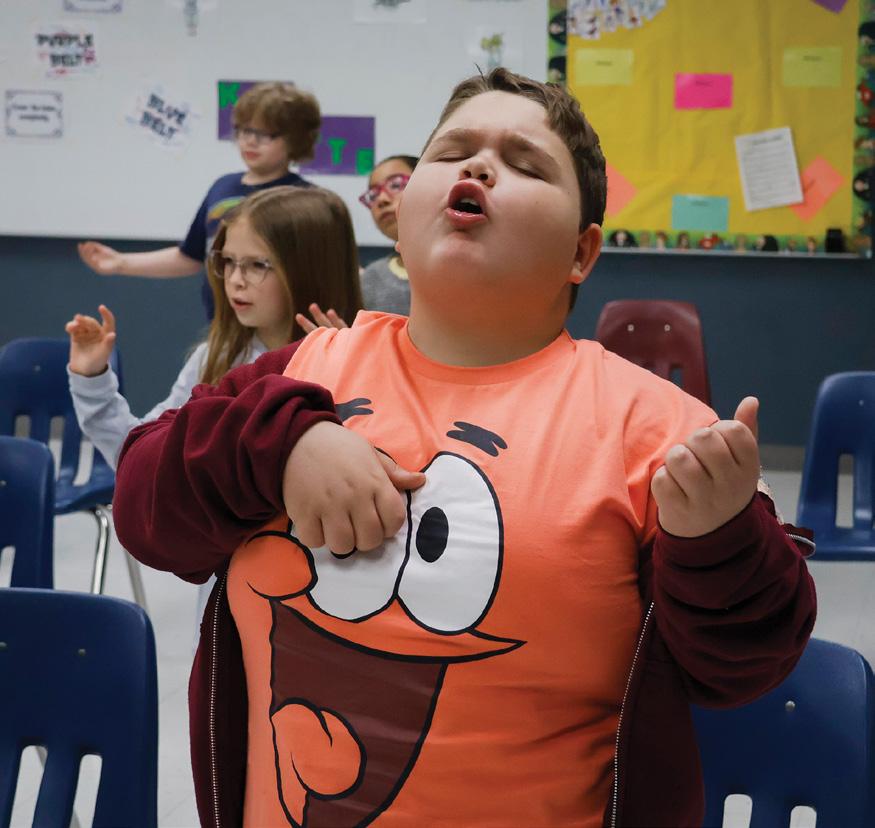
Cobden Elementary Student Brayden (above) Stanley strums his air guitar to the music in Wendy Ronna’s music class Friday, April 12, 2024. A class he missed while battling cancer in the early weeks of April. “I really like this class, it’s fun!” in Cobden, Illinois. (Amilia Estrada)

Brent Glays (above), moves fence from around the larger pasture while carrying his youngest son, Jonathan, around his chest April 12, 2024 at The Flock Farm in Anna, Illinois. Glays moves the fence up towards the barn in order to cut the pasture in half so the sheep can easily get to shelter during the rainy season. Pastures are rotated periodically in order to prevent overgrazing on the grass. (Lylee Gibbs | @ lyleegibbsphoto)


Cobden High School’s ESL Dance Team (above) practices a dance routine during their prep period April. 12, 2024 in Cobden, Illinois. (Amilia

